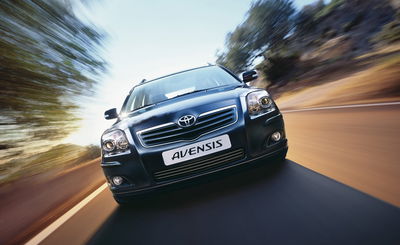Modern Cars Are A Nightmare That Will Soon Haunt Used Car Buyers Everywhere

This may sound overly dramatic, but we might all have sleepwalked into a used car disaster and it’s way too late to do anything about it.
We like used cars, right? They give us great value on paper: loads of bang for our buck, space for our Swiss franc and tech for our, err, Tunisian dinar. Easy to maintain yourself, too. Or not, as it happens.
This has just been rammed home to me in very expensive fashion. There I was, minding my own business, when my car – a 10-year-old diesel estate and a great workhorse – gradually started running worse and worse. It turned out that an injector had failed, and on closer inspection via a handy injector testing rig at a semi-local diesel specialist, the other three were failing too. Balls.

To cut a long story short, the bill was more than half the trade-in value of the car. Parts for high-pressure injection systems are expensive. If the bill had been for crash damage, my insurer would have written the car off. These repairs aren’t driveway tasks, either. Installing the injectors is no big deal (although the rocker cover had to come off), but they need special coding and setup that only a main dealer or specialist will have the equipment for. Even if you ask your friendly local independent to do it, they’ll most likely just send the injectors off to the same specialist you could have visited yourself.
If the idea of four-figure bills that you can’t reduce by doing the spannering yourself doesn’t frighten you just a bit, it should. Remember, my car is a decade old. Most cars that have been made since then also have a high-pressure fuel injection system, with petrols having joined the fun many years ago for the sake of efficiency. That’s also far from the only palm-moisteningly costly part that could fail as modernish cars age.

Putting two and two together, here, you get bad news. Of course buying a used car is a risk; it always has been, but the incoming potential for huge bills is staggering. An injector, for example, isn’t an affordable consumable any more. For an old car you might be looking at £60 per unit. The ones in, say, a seven or eight-year-old Land Rover Discovery 4 TDV6 cost £650. Each. Plus, at the very least, garage labour costs to calibrate them properly. If all of them are on the way out, like mine, by the time you’ve added professional diagnostics and labour, you could be looking at £5000.
With surprise costs like these waiting to bend you over and insert a large cactus into your darkest recesses, how long is it going to be before any car outside its warranty period becomes a risk not worth taking? If 12 months into ownership you’re smacked with a four-figure bill, you might as well have bought new. Aftermarket warranties aren’t worth the paper they’re written on (having had two myself and witnessing first-hand the various infuriating get-out clauses), and with cheap PCP and lease deals aplenty, used car ownership suddenly doesn’t look quite as rosy as it used to.

Expand this to today’s cars. Is there something you’ve got your eye on? Something you’d like to poach from the classifieds when it gets old and cheap enough? Forget it, unless you’ve got big cash reserves. Things like the complex electrics in modern swivelling headlights or keyless entry systems, emissions-reduction systems, active driver aids and more will be ridiculously expensive to fix. Why bother at all? When the cars are a decade old, all this tech is just putting your wallet at ever greater risk of being violated.
One answer, of course, is to buy even older cars; simpler cars with simpler engines. Stuff from the early 2000s and pre-Millennium. Simpler usually means cheaper to fix. How does the saying go? The simplest solutions are often the best. When it comes to car makers, this nugget of old-fashioned wisdom has long since been forgotten. And used car buyers like us are the ones who’ll end up paying for it.













Comments
So does this mean that I have a even better chance of buying a E46 M3 in Frost White? Woo Hoo!
I’ve considered this before. I don’t think we have much to worry about for long. In previous eras, the technology packed into cars would be considered a disaster waiting to happen as well. I think we’ll be able to progress to a level where these failures are easy to fix, just like we have with older tech.
No way, things that take time to dissasemble will never be done easy and quick unless the cars start being built differently again but those that already are overcomplicated will be a failure as used ones.
No its not, its all the crap that gets in the way which makes it hard and difficult (as well as the expensive parts and labor). All that plastic, all the accessories hanging off the motor, compact designs with stuff that will fail being in a near impossible place to reach, All the stuff a car does not need. That is the problem
The Turbo on my dad’s 2007 Touran 1.9TDi just went, 2 weeks after changing the DMF and clutch(1500€ for both-turbo+dmf+clutch). All that at 140 000km.
I have told him multiple times german cars today aren’t what people think they are(as reliable as a Golf Mk2/M-B W124) but he still uses the phrase “This is the Mercedes of … “ as in this is the best of all …
Losing the clutch at 140.000 km is absolutely normal. I would expect the springs to die out soon too. Break plates too. Now the dmf is weird. Mine looks like new at 97.000 km
My car’s clutch died out at 62.000 km cause a woman was driving it before i bought it, and she never lifted her foot off the pedal… go figure.
I know many people who have cars with that engine (two Tourans even) and nobody had a turbo problem. One of them clocked 400,000km.
THE LEXUS GS 300 IS NOT UNINTRESTING
when you put a 2jz gte in it ;)
or if you get the 1UZ GS400
Heh, good luck everyone. You might think I’m an idot buying used VW Up for 5k instead of e60, or for buying new Clio for 12k instead of imported f30 with many miles on the clock for the same. But if Up blows it’s engine fix won’t be half the worth of the car, if something electronic in your e60 brakes you will pay more then car is worth. And Clio has 5 years warranty, if it is looking good after 5 years we will keep it for another year or two, if not exchange it after warranty is out. As for early 2000 cars, thanks but no thanks, I like my tech and don’t want to be left in middle ages.
The vw up? you kidding? the engine retail price is beyond 5.000
Unless you go for used and maybe blow the second engine too by the end of the week.
I am sticking with my car until it dies.
Truth is, when more advanced technology is involved with a metal moving machine that you put through rain wind and heat, the less reliable it gets. There’s only so many people caring about their vehicles, properly maintaining them, not roughing them up, not driving like total idiots, and thats where profit is.
Putting more expensive materials in everyday cars means more future profit from part sales and services.
If someone thinks the car industry is making most of their money from car sales, is naive. Maintenance is a huge yearly income. Thats cause if you buy a 20.000 car, you dont go to the corner mechanic to have it inspected, you go straight to the car company. Most people do.
i can agree with maintenance being the main profit. In the last years chinese cars came to my country (yeah, cheap copies of popular makers) offering loads of equipment for the same or even lower price than entry level trim of traditional makers.
And they have some tendency to need replacement parts sooner than other makers (my brother had an BYD F0, the chinese Toyota Aygo and had to change the clutch and anti-roll bar bushings just at 40.000 km)
but their spare parts are pretty expensive, with replacement parts in the same price league or even higher than korean and japanese cars replacement parts, and paying the same price of a korean/japanese original parts, for a original chinese part feels wrong, and generic (also chinese) parts are just about 10-20% cheaper.
So, by this train of tought, i’de never be able to own any car that i like, even second hand. A brand new Giulia (wich is one of them) costs about 620€ per month/financing…I make 610€ per month, total. I guess I don’t need to eat, or a house…
This is one of the many reasons I daily drive a 37 year old Toyota. It ain’t gonna break, and if it does, I can fix it with zip-ties and keep driving it for another 37 years.
Fully agree there mate
And people actually laugh at me for talking about missing/enjoying a car with almost no electronics or simply saying I want less fluff in a car.
Pagination